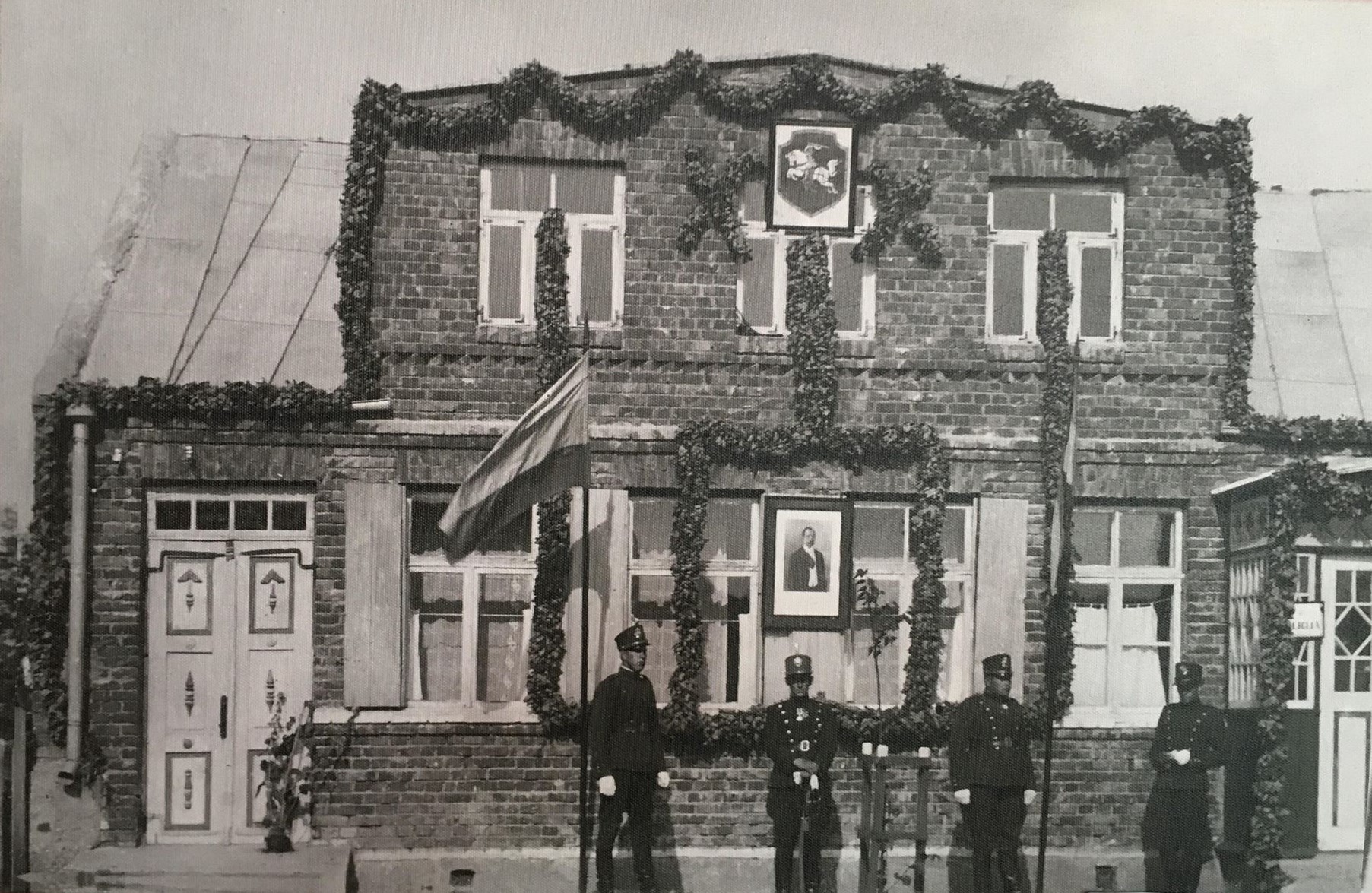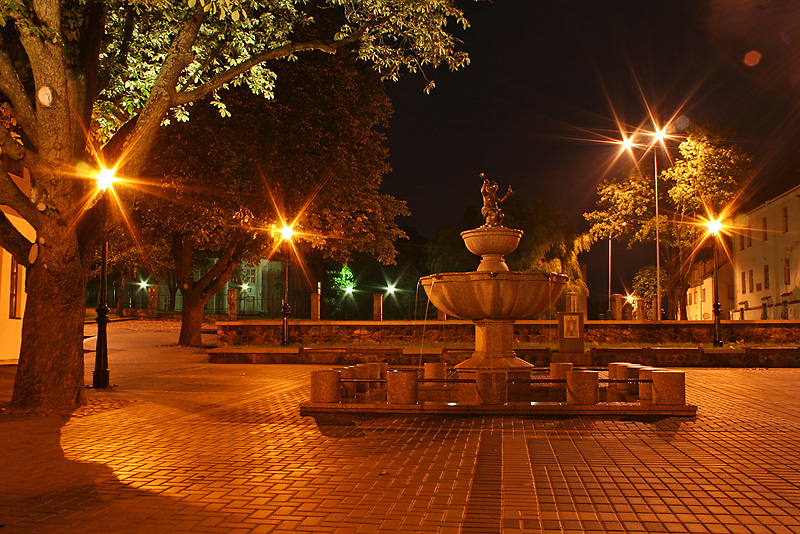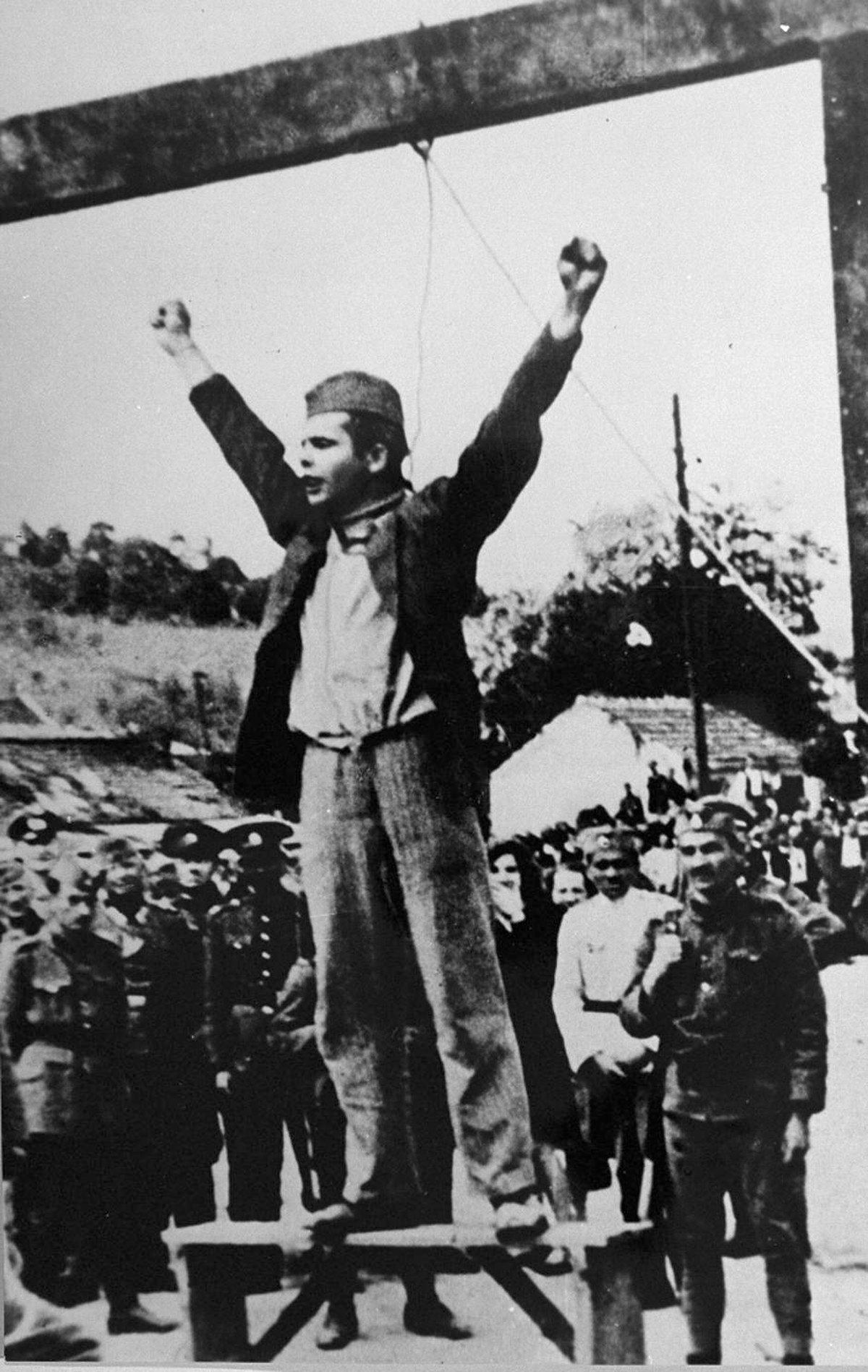|
Povilas Plechavičius
Povilas Plechavičius (1 February 1890 – 19 December 1973) was an Imperial Russian and then Lithuanian military officer and statesman. In the service of Lithuania he rose to the rank of General of the army in the interwar period. He is best known for his actions during the Lithuanian Wars of Independence, for organizing the 1926 Lithuanian coup d'état and for leading a Lithuanian collaborationist militia during the German occupation of Lithuania. Early life Povilas Plechavičius was born on February 1, 1890, in Židikai District to Lithuanian farmer Ignas Plechavičius. His mother was Lithuanian noblewoman Konstancija Bukontaitė. In 1908, he graduated from a gymnasium in Moscow, in 1911 from Institute of Commerce. During World War I In 1914, Povilas Plechavičius graduated from the Orenburg cavalry war school. During World War I he fought with the Russian army against the German Empire, Austria-Hungary and the Ottoman Empire. During the war, he was wounded three ti ... [...More Info...] [...Related Items...] OR: [Wikipedia] [Google] [Baidu] |
Židikai
Židikai (Samogitian language, Samogitian: ''Žėdėkā'') is a town in Mažeikiai district municipality, Lithuania. It is located 21 km west of Mažeikiai. Židikai is the seat of Elderships of Lithuania, Židikai elderate. Židikai is known for being the home of Šatrijos Ragana, Marija Pečkauskaitė – Šatrijos Ragana, a famous Lithuanian writer (1877–1930) for the last 15 years of her lifetime. Etymology Židikai originates from the words ''Žydi kaip laukas'' (''blooms like a field'' in English), or from the word ''Židikis'' (meaning ''tough''). Židikai was first mentioned in historic records in 1568 AD. History From 1614, Židikai was held by the Kražiai Society of Jesus, Jesuits. In 1659, during the Northern Wars, Sweden, Swedish forces burnt down Židikai. Between 1918 and 1939, when Lithuania was established as an Act of Independence of Lithuania, independent state, Židikai prospered. It was both a center of a parish as well as services and a ... [...More Info...] [...Related Items...] OR: [Wikipedia] [Google] [Baidu] |
Orenburg
Orenburg (russian: Оренбу́рг, ), formerly known as Chkalov (1938–1957), is the administrative center of Orenburg Oblast, Russia. It lies on the Ural River, southeast of Moscow. Orenburg is also very close to the Kazakhstan-Russia border, border with Kazakhstan. Population: Name Several historians have tried to explain the origins of the city's name. It was traditionally accepted that the word "orenburg" means a fortress on the Or River, River Or. In all probability, the word combination "orenburg" was proposed by , the founder of the city. In 1734, in accordance with his project, a package of governmental documents was worked out. This was the starting point for Orenburg as a fortress city near the meeting of the Or (river), Or and Ural rivers. On 7 June 1734, "A Privilege for Orenburg" (tsar's edict) was ordered by Anna of Russia, Empress Anna Ioannovna. While the construction site of the main fortress changed many times (down the River Ural), the name "Orenburg" ... [...More Info...] [...Related Items...] OR: [Wikipedia] [Google] [Baidu] |
Telšiai
Telšiai (; Samogitian: ''Telšē'') is a city in Lithuania with about 21,499 inhabitants. It is the capital of Telšiai County and Samogitia region, and it is located on the shores of Lake Mastis. Telšiai is one of the oldest cities in Lithuania, probably dating earlier than the 14th century. Between the 15th and 20th centuries, Telšiai became a district capital and between 1795 and 1802 it was included in the Vilnius Governorate. In 1873, Telšiai was transferred to the Kovno Governorate. Names The name Telšiai is a variant of the same Lithuanian language root (''-telš-'', ''-tilž-'') as Tilžė with the meaning connected to water. The name Telšiai or Telšē in Samogitian dialect of Lithuanian is derived from a verb ''telkšoti'' (literally, ''to be flooded with water'', ''to splash'', etc.). The name of Telšiai has been recorded in different forms and different languages throughout its history. Most of them are derived from ''Telšē'' in Samogitian dialect. Some ... [...More Info...] [...Related Items...] OR: [Wikipedia] [Google] [Baidu] |
Seda, Lithuania
Seda () is a city in Mažeikiai district municipality, Lithuania. It is south-west of Mažeikiai on the Varduva River. There are two churches in the town. History According to Kazimieras Būga, the name of Seda is of hydronymic origin and was derived from the name of nearby Lake Seda also known as Sedula. Seda was first mentioned in written sources in the 13th century. From the 15th century Seda was famous as a busy trade settlement with Livonia. The town of Seda was established in 1500 and in 1508 the parish was founded. In the middle of 17th century, Seda suffered great losses during the Second Northern War, but recovered in the 18th century. In 1770, ciwun Vaclovas Bartoškevičius and his wife Elžbieta Juškaitėthe sponsored construction of the Catholic Church of the Assumption. The town belonged to the Sapieha family, but their possessions were confiscated by the authorities of the Russian Empire for their participation the Uprising of 1831. Town residents also were ... [...More Info...] [...Related Items...] OR: [Wikipedia] [Google] [Baidu] |
Bermontians
The West Russian Volunteer Army or Bermontians was a pro-German military formation in Latvia and Lithuania during the Russian Civil War in 1918–20. History The Western Russian Volunteer Army, unlike the pro- Entente Volunteer Army, was supported and in fact created by Germany. The Compiègne Armistice, article 12, stipulated that troops of the former German Empire were to remain in the Baltic provinces of the former Russian Empire to help fight Bolshevik advances and were to withdraw once the Allies determined the situation was under control. The order to withdraw was given after the Treaty of Versailles was signed in June 1919. However, only a small portion of the Freikorps in the Baltic retired; the rest stayed under the leadership of General Rüdiger von der Goltz. To avoid casting blame on Germany and infuriating the Allies, he withdrew into the background and merged his troops with the "Special Russian Corps", led by Cossack General Pavel Bermondt-Avalov. The two ge ... [...More Info...] [...Related Items...] OR: [Wikipedia] [Google] [Baidu] |
Bolshevik
The Bolsheviks (russian: Большевики́, from большинство́ ''bol'shinstvó'', 'majority'),; derived from ''bol'shinstvó'' (большинство́), "majority", literally meaning "one of the majority". also known in English as the Bolshevists,. It signifies both Bolsheviks and adherents of Bolshevik policies. were a far-left, revolutionary Marxist faction founded by Vladimir Lenin that split with the Mensheviks from the Marxist Russian Social Democratic Labour Party (RSDLP), a revolutionary socialist political party formed in 1898, at its Second Party Congress in 1903. After forming their own party in 1912, the Bolsheviks took power during the October Revolution in the Russian Republic in November 1917, overthrowing the Provisional Government of Alexander Kerensky, and became the only ruling party in the subsequent Soviet Russia and later the Soviet Union. They considered themselves the leaders of the revolutionary proletariat of Russia. Their beliefs and ... [...More Info...] [...Related Items...] OR: [Wikipedia] [Google] [Baidu] |
Partisan (military)
A partisan is a member of an irregular military force formed to oppose control of an area by a foreign power or by an army of military occupation, occupation by some kind of insurgent activity. The term can apply to the field element of resistance movements. The most common use in present parlance in several languages refers to Resistance during World War II, occupation resistance fighters during World War II, especially under the Yugoslav Partisans, Yugoslav partisan leader Josip Broz Tito. History before 1939 The initial concept of partisan warfare involved the use of militia , troops raised from the local population in a war zone (or in some cases regular forces) who would operate behind enemy front line , lines to disrupt communications, seize posts or villages as forward-operating bases, ambush convoys, impose war taxes or contributions, raid logistical stockpiles, and compel enemy forces to disperse and protect their base of operations. George Satterfield has analyse ... [...More Info...] [...Related Items...] OR: [Wikipedia] [Google] [Baidu] |
Povilas Plechavičius Photographed In The Front Of The Lithuanian Wars Of Independence, 1919
Povilas is a Lithuanian masculine given name and may refer to: *Povilas Aksomaitis (1938–2004), Lithuanian engineer, politician, and signatory of the 1990 Act of the Re-Establishment of the State of Lithuania * Povilas Budrys (born 1962), Lithuanian painter *Povilas Bartušis (born 1993), Lithuanian male badminton player *Povilas Butkevičius (born 1987), Lithuanian former basketball player *Povilas Jakubėnas (1871–1953) Lithuanian Calvinist clergyman, general superintendent of the Lithuanian branch of the Reformed Church *Povilas Leimonas (born 1987), Lithuanian footballer *Povilas Lukšys (footballer) (born 1979), Lithuanian footballer *Povilas Meškėla (born 1964), Lithuanian rock singer and musician (Rojaus tūzai and Katedra) *Povilas Mykolaitis (born 1983), Lithuanian long jumper *Povilas Plechavičius (1890–1973), Imperial Russian and then Lithuanian military officer and statesman *Povilas Stravinsky, Lithuanian pianist active in the United States *Povilas Stulga Mus ... [...More Info...] [...Related Items...] OR: [Wikipedia] [Google] [Baidu] |
Samogitia
Samogitia or Žemaitija ( Samogitian: ''Žemaitėjė''; see below for alternative and historical names) is one of the five cultural regions of Lithuania and formerly one of the two core administrative divisions of the Grand Duchy of Lithuania alongside Lithuania proper. Žemaitija is located in northwestern Lithuania. Its largest city is Šiauliai. Žemaitija has a long and distinct cultural history, reflected in the existence of the Samogitian language. Etymology and alternative names Ruthenian sources mentioned the region as жемотьская земля, ''Žemot'skaja zemlja''; this gave rise to its Polish form, , and probably to the Middle High German . In Latin texts, the name is usually written as etc. The area has long been known to its residents and to other Lithuanians exclusively as Žemaitija (the name Samogitia is no longer in use within Lithuania and has not been used for at least two centuries); Žemaitija means "lowlands" in Lithuanian. The region is also ... [...More Info...] [...Related Items...] OR: [Wikipedia] [Google] [Baidu] |
Caucasus Campaign
The Caucasus campaign comprised armed conflicts between the Russian Empire and the Ottoman Empire, later including Armenia, Azerbaijan, Georgia, the Mountainous Republic of the Northern Caucasus, the German Empire, the Central Caspian Dictatorship, and the British Empire, as part of the Middle Eastern theatre during World War I. The Caucasus campaign extended from the South Caucasus to the Armenian Highlands region, reaching as far as Trabzon, Bitlis, Mush and Van. The land warfare was accompanied by naval engagements in the Black Sea. The Russian military campaign started on 1 November 1914 with the Russian invasion of Turkish Armenia. In February 1917, the Russian advance was halted following the Russian Revolution. The Russian Caucasus Army soon disintegrated and was replaced by the forces of the newly established Armenian state, comprising Armenian volunteer units and irregular units which had previously been part of the Russian Army. During 1918 the region also s ... [...More Info...] [...Related Items...] OR: [Wikipedia] [Google] [Baidu] |
Aleksandras Plechavičius
Aleksandras Plechavičius (1 June 1897 – 6 May 1942) was a Lithuanian military officer in the Imperial Russian Army and then the Lithuanian Army. In the service of Lithuania, he rose to the rank of colonel in the interwar period. He was a younger brother to the more famous Povilas Plechavičius. Early life Aleksandras Plechavičius was born on 1 June 1897, in farmstead in the Židikai District to the Lithuanian farmer Ignas Plechavičius. His mother was the Lithuanian noblewoman Konstancija Bukontaitė. Aleksandras had ten siblings. He studied at the Mitau Gymnasium. Active military service Aleksandras Plechavičius was mobilised to the Imperial Russian Army in 1914. Together with his elder brother Povilas, he completed the . While fighting against the Germans and the Ottomans, he was injured twice. In 1917, he was promoted to the commander of his cavalry squadron. He returned from the front with his brother Povilas to Lithuania in July 1918. In November 1918, he enlisted ... [...More Info...] [...Related Items...] OR: [Wikipedia] [Google] [Baidu] |
Ottoman Empire During World War I
The Ottoman Empire came into World War I as one of the Central Powers. The Ottoman Empire entered the war by carrying out a surprise attack on Russia's Black Sea coast on 29 October 1914, with Russia responding by declaring war on 2 November 1914. Ottoman forces fought the Entente in the Balkans and the Middle Eastern theatre of World War I. The Ottoman Empire's defeat in the war in 1918 was crucial in the eventual dissolution of the empire in 1922. Entry into World War I Ottoman entry into World War I was the result of two recently purchased ships of its navy, still manned by their German crews and commanded by their German admiral, carrying out the Black Sea Raid on 29 October 1914. There were a number of factors that conspired to influence the Ottoman government, and encourage them into entering the war. The political reasons for the Ottoman Sultan's entry into the war are disputed and the Ottoman Empire was an agricultural state in an age of industrial warfare. Also, th ... [...More Info...] [...Related Items...] OR: [Wikipedia] [Google] [Baidu] |








